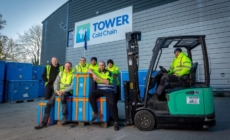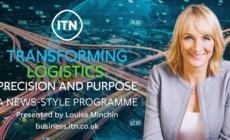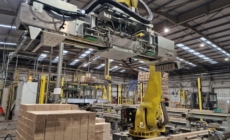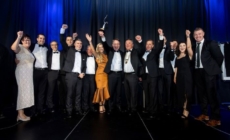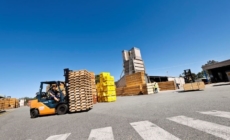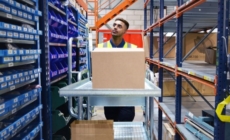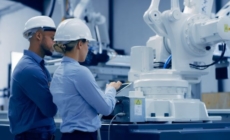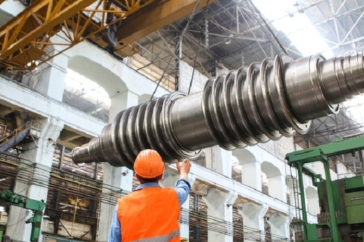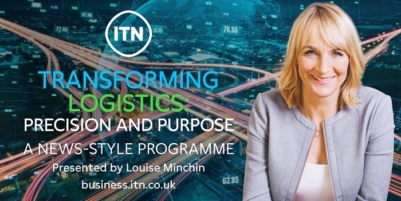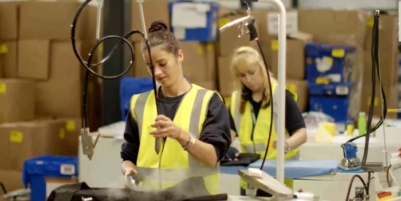-
Tower Launches Customer Sustainability Hub with Practical Tools for Lower-Impact Pharmaceutical Cold Chain - October 16, 2024
-
Six decision-making models for best practice WMS digital transformation - October 16, 2024
-
“Transforming Logistics: Precision and Purpose” – BIFA takes centre stage - October 15, 2024
-
JAMES JONES & SONS LTD EXPANDS ITS PALLETS & PACKAGING DIVISION THROUGH THE ACQUISITION OF HG TIMBER LTD - October 10, 2024
-
HUGO BECK EXPANDS MACHINE RANGE FOR E-COMMERCE, MAIL ORDER AND LOGISTICS - October 10, 2024
-
Winning Irish Exporter of the Year, Combilifts CEO Martin McVicar talks about the journey into the Global Market - October 8, 2024
-
JAMES JONES & SONS’ AUSTRALIAN SUBSIDIARY, HYNE GROUP, EXPANDS TO WESTERN AUSTRALIA - October 3, 2024
-
QUECLINK LAUNCHES SOLAR-POWERED ASSET TRACKER FOR TRAILERS AND CONTAINERS - October 3, 2024
-
Southgate Global Calls for Greater Health and Safety in the Warehouse Back Care Awareness Week - October 3, 2024
-
Nulogy to Expand Capabilities with Strategic Acquisition of Mingo Smart Factory - October 3, 2024
Manufacturing businesses are realising that sustainability is about more than just the environment and reaching Net Zero
I was invited to present a keynote and join a panel discussion on sustainability in manufacturing at this year’s Manufacturing & Supply Chain Conference & Exhibition which took place on 10th March at MK Arena in Milton Keynes. It was a great opportunity to talk face to face with a number of manufacturing businesses to find out what they are doing and what sustainability means to them.
Clearly, a small number of companies understand that sustainability is not just about the environment and achieving Net Zero. It’s actually about much more than that. It’s about the sustainability of people, of society and the role that business has to play there, and of course, economic sustainability too.
What I also gained from discussions during the conference was that there is more cognisance around the fact that unless these companies change their whole business operation, they will get left behind. There is a real sense of these businesses being on a burning platform, and that they are having to not only comply with new rules, but actually get ahead of them and show some leadership.
There also appeared to be a greater willingness by delegates to take an honest look at where their business is right now with regards to sustainability, even if this meant admitting that their current practices weren’t truly aligned with their values, or at worst, were at risk of being considered greenwashing. What was clear was that the vast majority described themselves as ‘actively aspiring’ to achieve their sustainability and Net Zero targets, indicating something which I have been saying for some time, that many businesses want to change but simply don’t know how.
As we emerge post-pandemic and in the wake of another damning report into the effects of climate change by the IPCC, there will be even greater pressure on manufacturers to not only create a clear plan towards achieving Net Zero, but actually act upon it and make it happen. I would urge manufacturers to really think about what they are going to do over the next five years because things are going to start happening very quickly now. We are likely to see a lot of companies go out of business in the next few years simply because they didn’t react fast enough.
Those that do react, will need to ensure that sustainability is not just a bolt-on activity, a tick box exercise, or a matter of compliance. It must be central to the way the entire business is structured, operates and communicates with its staff, suppliers, investors and with society as a whole.
A great example of a company that has achieved this is Dutch logistics company, Euro Pool. Euro Pool is the largest logistics service provider of reusable packing trays in the European fresh fruit and vegetable supply chain. It operates 73 service centers in 18 countries for clients in 27 countries. Euro Pool has three words at the core of their business, ‘maximizing circular value’ and they apply that doctrine to everything they do. The phrase sounds like a marketing strapline, but actually, it’s a call to action underpinned by values and an explanation of what value it brings and is applied to every single part of their business, from procurement to human resources, to supply chain and sales and marketing. It is massively powerful when everybody buys into something that they really want to do. is the starting point for manufacturers – understanding what their single, organizing idea is. Once uncovered, this will shape the entire future direction of the business and ensure that it holds itself to account for keeping true to its core idea, or purpose.
Despite good intentions, many businesses simply become overwhelmed with the process and never end up getting started. In fact, a recent report by the Carbon Disclosure Project found only one third of companies are currently developing transition plans. The whole process can sound horribly complicated but I can assure you it really isn’t. A lot of this is common sense stuff and of course, the devil is in the detail, but it is entirely possible to do it very quickly indeed.
The good news is that the technology now exists to help make this transition even easier. Launched at COP26, The Single Organizing Idea System™ measures the level of alignment with that single organizing idea throughout the business, on a continual basis, providing indisputable, independent and measurable proof of whether a company is really walking the talk, or simply paying lip service to the cause.
There is no denying that the year ahead will be rocky as global events continue to shake the foundations of what has been before and pave the way for new ideas, new thinking, and new ways of doing business. I’ve come away from the Manufacturing & Supply Chain Conference hugely optimistic that the manufacturing sector is not only capable of change, but of doing so quite rapidly.
Neil Gaught is a strategy advisor, best-selling author and co-founder of Single Organizing Idea. He specialises in helping businesses to regorganise around sustainable ideas.


